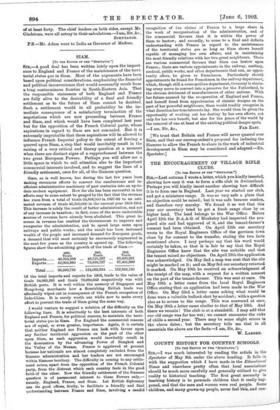SIAM.
[To THE EDITOR OF THE "SPECTATOR-1
SI8,—A good deal has been written lately upon the import. ance to England and France of the maintenance of the terri- torial status quo in Siam. Most of the arguments have been based upon political considerations, emphasising the financial and political inconvenience that would necessarily result from a long conterminous frontier in South-Eastern Asia. That the responsible statesmen of both England and France are fully alive to the desirability of a final and friendly settlement as to the future of Siam cannot be doubted. Such a settlement would in all probability be the im- mediate consequence of a satisfactory termination of the negotiations which are now proceeding between France and Siam, and which would have been completed last year but for the opposition of the French Colonial party, whose aspirations in regard to Siam are not concealed. But it is extremely improbable that these aspirations will be allowed to influence French Imperial policy to the extent of forcing a quarrel upon Siam, a step that would inevitably result in the raising of a very critical and thorny question at a moment when there are distinct signs of a rapprochement between the two great European Powers. Perhaps you will allow me a little space in which to call attention also to the important commercial interests involved, and to suggest the lines of a friendly settlement, once for all, of the Siamese question.
Siam, as is well known, has during the last few years been making strenuous efforts to convert the cumbersome and in- efficient administrative machinery of past centuries into an up-to- date modern equipment. How far she has been successful in her efforts may to some extent be gauged by the fact that the revenue has risen from a total of ticals 24,808,000 in 1897-98 to an esti- mated revenue of ticals 45,500,000 in the current year 1903-1904. This increase is solely the result of better administration, and not of any increase in taxation ; in fact, some of the more undesirable sources of revenue have already been abolished. This great in- crease in revenue has enabled the Government to improve and reorganise the administration, and to spend large sums upon railways and public works ; and the result has been increased wealth of the people and increased demand for European goods, a demand that will most certainly be enormously augmented in the next few years as the country is opened up. The following figures show the astonishing growth of the trade of Siam :-
1900.
Ticals. 1901. Ticals. 1902. Ticals.
Imports 43,394,358 48,525,597 65,420,231 Exports 52,005,380 75,536,727 87,401,889 Total 95,399,738 ... 124,062,324 ... 152,822,120
Of the total imports and exports for 1902, trade to the value of ticals 54,963,265 and ticals 78,980,642 respectively was with British ports. It is well within the memory of Singapore and Hong-kong merchants how a flourishing British trade was effectually wiped out in consequence of the French occupation of Indo-China. It is surely worth our while now to make every effort to prevent the trade of Siam going the same way.
I would venture to suggest a solution of the difficulty on the following lines. It is admittedly to the best interests of both England and France, for political reasons, to maintain the terri- torial status quo in Siam. For England the commercial reasons are of equal, or even greater, importance. Again, it is certain that neither England nor France can look with favour upon any further territorial aggression on the part of the other upon Siam, as such aggression would inevitably result in the domination by the advancing Power of Bangkok and the Valley of the Menam. France is aggrieved at present because her nationals are almost completely excluded from the Siamese administration and her traders are not encouraged within Siamese territory. The difficulty in coming to any settle- ment arises, apart from the opposition of the French Colonial party, from the distrust which each country feels in the good faith of the other. Now the friendly settlement of the Siamese question is of paramount interest to three Powers only,— namely, England, France, and Siam. Let British diplomacy use its good offices, firstly, to facilitate a friendly and final understanding between France and Siam, involving a candid recognition of the claims of France to a largo share in the work of reorganisation of the administration, and of the commercial favours that it is within the power of Siam to bestow; and secondly, to come to a final and definite understanding with France in regard to the maintenance of the territorial status quo so long as Siam shows herself capable of managing her own affairs, and in maintaining the most friendly relations with her two great neighbours. There are various commercial favours that Siam can bestow upon France ; there are various appointments in the railway, sanitary, medical, public works, and other departments that can, as oppor- tunity offers, be given to Frenchmen. Particularly should appointments be found for Frenchmen in the railway department, which, though still a cosmopolitan department, Germany is strain. ing every nerve to convert into a preserve for the Fatherland, to the obvious detriment of manufacturers of other nations. With her future assured by the co-operation of England and France, and herself freed from apprehension of sinister designs on the part of her powerful neighbours, Siam would readily recognise in what direction her true interests lay. She would then be given the opportunity of working out her destiny by her own efforts, not only for her own benefit, but also for the peace of the world by the removal of one at least of the existing political danger spots.
[We trust that Britain and France will never quarrel over Siam, and that our correspondent's proposal for inducing the Siamese to allow the French to share in the work of industrial development in Siam may be considered and adopted.—En. Spectator.]










































 Previous page
Previous page